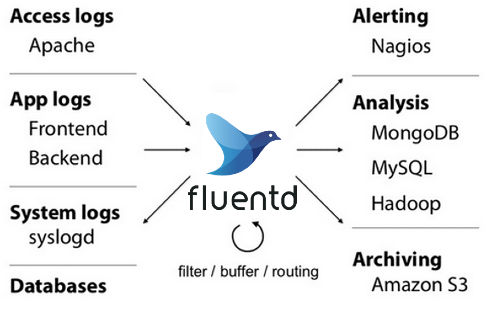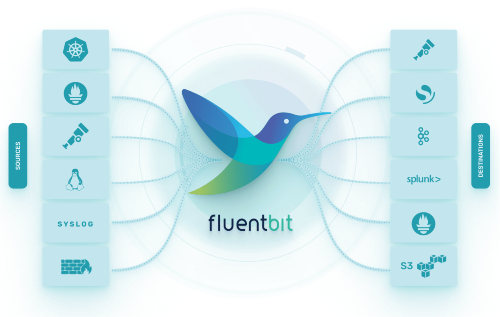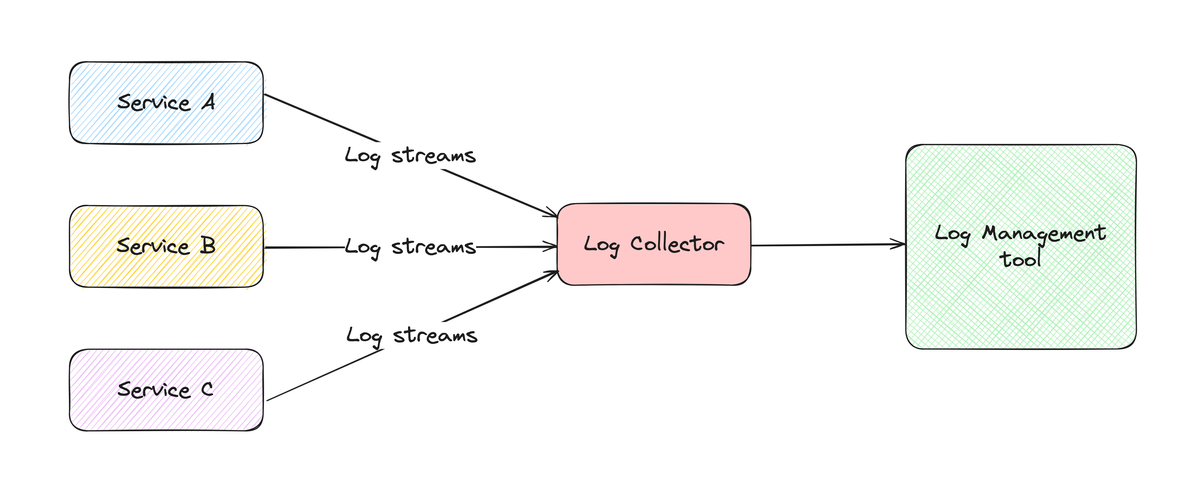In this blog, we'll discuss Open Source tools for log management. There are numerous open-source options available for managing application logs, syslog, and more. Log Shipper helps to centralize all logs from different area like application log , syslog, networks, etc... , Here, we'll focus on some of the most popular tools. Let's begin with Logstash.
Logstash
Logstash is a tool for gathering data from different places using plugging, changing it in different ways by filtering plugins, and sending it to different destinations with output plugins. Logstash can handle virtually any kind of log you deal with, such as system logs, web server logs, error logs, and application logs. Using Logstash makes it incredibly simple to gather all logs and store them in one central location.
Pros:
- Logstash offers regex pattern sequences to identify and parse the various fields in any input event.
- Logstash supports a variety of web servers and data sources for extracting logging data.
- Logstash is centralized, which makes it easy to process and collect data from different servers.
- Logstash supports many databases, network protocols, and other services as a destination source for logging events.
Cons:
- Utilizes high memory
- When Logstash 7.13 was released, it introduced a breaking change that prohibits Logstash from sending logs to non-Elastic versions of Elasticsearch, such as OpenSearch.
- Filter plugins are not generic, so, the user may need to find the correct sequence of patterns to avoid errors in parsing.
FluentD

FluentD is a data collector that's both free and open-source. FluentD is a cross-platform software project initially created at Treasure Data. Its primary purpose is to address the complexities of big data log collection. Licensed under the Apache License v2.0, FluentD is coded in the Ruby programming language. Its decentralized setup is famous for its reliability and ability to work seamlessly across different platforms. One major hurdle in collecting big data is the absence of a common standard among sources, making communication difficult. However, FluentD bridges this gap, enabling easier communication and tackling one of the main obstacles in big data log collection.
Pros:
- Setting up FluentD is easy, with more than 500 plug-ins to support.
- Due to its open-source nature, FluentD can be used without any restrictions.
- Reliability and high performance.
- FluentD in Kubernetes benefits from a large and devoted community that actively supports its advancement and evolution.
Cons:
- One of its main challenges is performance. Although much of Fluentd is written in C, its plugin framework is implemented in Ruby.
- A Fluentd instance can typically process approximately 18,000 events per second
Fluentbit

Fluent Bit is an open-source, multi-platform tool that serves as a universal solution for processing and distributing logs. Fluent Bit, developed by the same team behind Fluentd at Treasure Data Fluent Bit steps in to assist in aggregating and processing all your data reliably, securely, and with flexibility. Fluent Bit is developed entirely in pure C and has support for embedded Linux. It uses less memory than fluentd.
Why was FluentBit developed ?
The aim was to deliver the speed, scalability, and flexibility of Fluentd in a smaller, more efficient footprint. The outcome was Fluent Bit. Comparing to Fluentd, it has a small size .
Pros:
- High Performance at low CPU and Memory footprint.
- Portable, and runs on Linux, MacOS, Windows, and BSD systems.
- Application size is less compared to others.
Cons:
- Fewer plugins are available.
Filebeats
Filebeat is an open-source lightweight data shipper created by Elastic. Installed as agents on servers, Filebeat sends operational data to specified destinations. It monitors designated log files or locations, collects log events, and forwards them to Elasticsearch or Logstash for indexing and transformation.
Pros:
- Filebeat is a lightweight tool, that efficiently manages significant data loads without imposing heavy demands on system resources like memory and CPU.
- it doesn't have any dependencies, so easy to install.
- It is a single binary that supports both server and container deployments.
- Filebeat's functionality can be expanded through modules, which helps to fetch, parse, and forward logs.
Cons:
- Lacks built-in monitoring features that can provide health insights on Filebeat instances. so it would be difficult to monitor Filebeat's health.
- Filebeat has limited data processing capability compared to other tools
Vector
Vector is a lightweight, open-source, and high-performance log shipper designed to collect, process, and transmit logs and metrics to any chosen destination. Vector was developed by Timber, and later Datadog acquired it. Vector claims it is 10x faster than any other log shippers. Rudy Language is used to develop Vector.
Pros:
- It provides a single static binary, depending on libc, which is already present in most operating systems.
- The Vector Remap Language (VRL) is powerful and enables you to execute complex manipulations once you become proficient in it.
- Enhanced speed and optimized memory utilization are key features of Vector, ensuring efficient performance and resource management.
Cons:
- Compared to other tools, Vector has fewer plugin supports.
- The Vector Remap Language (VRL) is powerful, but it has a steeper learning curve compared to some other tools.
We discussed 5 open-source tools, each with its advantages and disadvantages. Every log management tool is developed with a specific purpose in mind and to overcome the disadvantages of existing tools. End of the day it's all about Selecting the right tool based on our requirements, as there is no single shipper that offers every feature.

